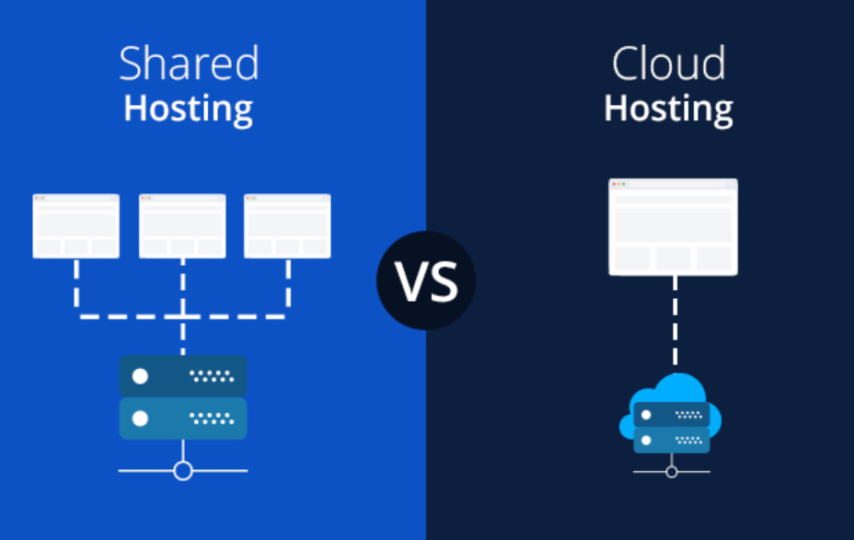When choosing infrastructure, deciding between shared and dedicated server hosting is crucial. Shared hosting is often appealing due to its perceived affordability and convenience. However, it usually comes with hidden expenses that make managing overheads challenging.
This blog post will explore the distinctions between shared and dedicated server hosting, offering insights to guide you in a more informed decision-making process.
What is shared hosting?
Shared hosting involves dividing whole servers and their resources into portions. It’s like slicing up a pizza so multiple people can enjoy a piece. Shared hosting allows various businesses to share a ‘slice’ or ‘slices’ of a server, also known as web hosting.
Shared hosting became popular after the dot com boom when demand for more affordable hosting options increased due to the rising number of websites. Instead of investing in an entire server, smaller companies turned to shared hosting, allowing them to rent the necessary server resources.
Typically, there are three shared server hosting options: shared hosting, virtual private cloud (VPC), and public cloud.
1. Shared hosting: Under this model, multiple customers or websites use a single server. The hosting provider creates separate user accounts and assigns each customer a set amount of server resources. While this is usually enough for low bandwidth users, it may struggle under high-volume traffic applications. The most significant advantage of shared hosting is its affordability, but it comes with drawbacks such as security vulnerabilities and potential performance issues if other tenants overuse resources.
2. Public cloud hosting: Public cloud servers divide and deliver resources to multiple customers using a hypervisor. Customers access virtual machines that execute computing functions and run operating systems. These virtual machines are created on physical servers or clusters, and scaling is quick and easy by adding more virtual machines.
3. Virtual private cloud hosting: The virtual private cloud also uses virtualization, where the hypervisor splits the server into multiple virtual machines. Each virtual machine behaves as an independent account on the physical server. VPC creates a private computing environment on a shared public cloud infrastructure. Customers have logically isolated environments and can customize their virtual machines. Scaling is instant, and security is enhanced due to the isolation from other tenants.
With all shared server hosting options, even logically isolated networks, you still share a server with multiple customers, which can lead to performance issues and security concerns.
What is dedicated server hosting?
Dedicated server hosting refers to a server in a data center that is exclusively dedicated to one user. This means the server only hosts individual customers and does not allow multiple businesses to run their applications.
With dedicated server hosting, there is no need for virtualization or setting up multiple user accounts. Hosting providers offer bare metal servers to individual customers, giving them complete administrative access. The server resources, such as RAM, disk space, CPU, and bandwidth, are solely allocated for the designated tenant’s use.
Shared hosting vs dedicated server hosting
Resource allocation: With shared hosting resources are shared among multiple users on one physical machine, either directly or as a virtual machine. Whereas with dedicated server hosting, servers are single tenant, meaning resources are dedicated to one user.
Customization: Shared hosting offers limited customization options, whereas dedicated server hosting is fully customizable.
Scalability: Shared hosting is highly scalable, and additional resources can be added instantly. With dedicated server hosting, additional servers can be added in minutes, and customers can quickly scale up or down.
Security: Shared hosting must rely on other tenants to ensure good security practices. Your business could be vulnerable if other tenants are hacked. A dedicated server offers better security as the company’s resources are only accessible to tenants and therefore reliant only on their security practices.
Cost: Shared hosting is very affordable as you rent only the server resources you need. Dedicated server hosting is also affordable – paying on a month by month basis avoids high capital expenditure costs.
Uptime and reliability: Since the resources are shared in shared hosting, you may not have guaranteed access to all the resources you need at any given time. Your website or application could slow down if other tenants overuse server resources. Dedicated server hosting offers high uptime and reliability, as resources aren’t shared with others.
Conclusion
If you want to make an informed decision about your infrastructure, it’s essential to understand how hosting works and how dedicated server hosting compares to other options.
Dedicated hosting offers a range of benefits, including enhanced application resiliency and performance, improved security, and the ability to customize your system architecture to meet your needs.
When it comes to resource-demanding applications, dedicated server hosting is the obvious choice. It provides a solid foundation for reliable performance, control, and scalability.



